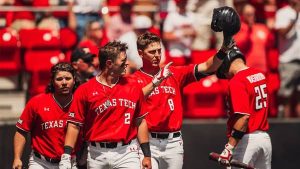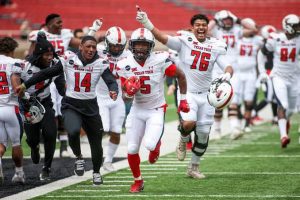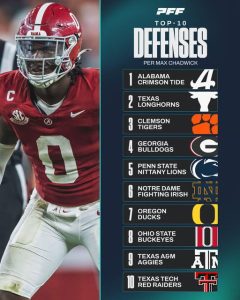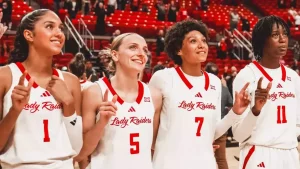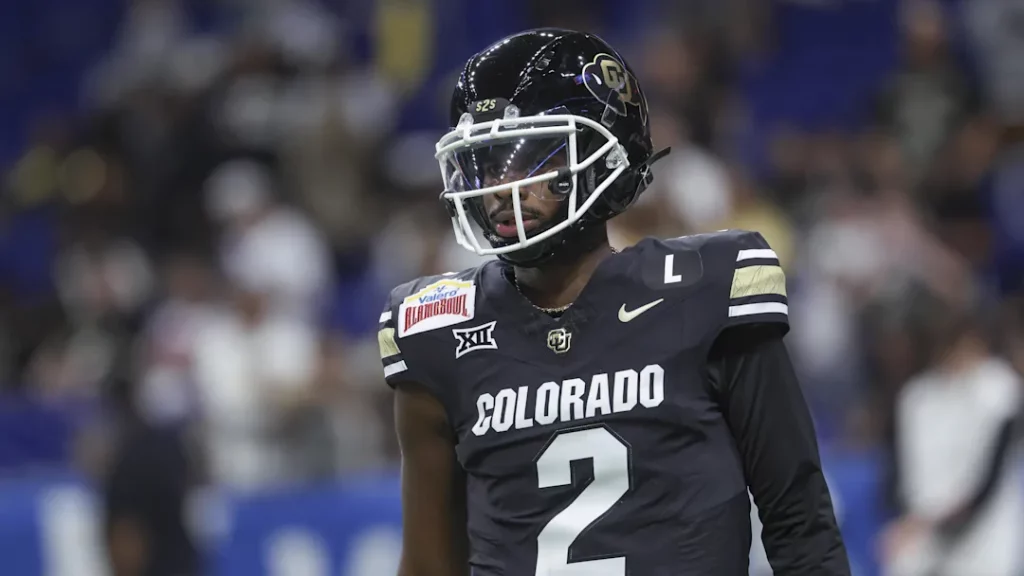
Shedeur Sanders entered the 2025 NFL Draft with a spotlight shining brightly on him—not just because of his own talents, but because of the weight of expectations that come with being the son of one of college football’s most famous coaches, Deion Sanders. As the younger Sanders took the college football world by storm with his dynamic playmaking ability at Colorado, questions arose about how his game would translate to the NFL. Now, as draft evaluations come into focus, NFL scouts and analysts are breaking down exactly what they see in Shedeur Sanders, separating the hype from the reality.
First and foremost, the discussion around Shedeur Sanders centers on his athleticism and natural talent. Scouts universally agree that he possesses a rare blend of arm talent, mobility, and football IQ. His ability to extend plays outside the pocket while maintaining accuracy under pressure is often highlighted as a key asset. In today’s NFL, where quarterbacks who can move and throw on the run are highly coveted, Sanders fits the mold of a modern-day dual-threat signal-caller. Many scouts see flashes of elite potential, noting how he consistently delivers tight-window throws and displays an advanced understanding of defenses, which speaks to his high football IQ.
But the enthusiasm is not without caution. Some scouts raise concerns about the level of competition Sanders faced in college, especially given that Colorado’s offense under Deion Sanders was explosive but not always tested against elite defensive units. This has led to some questions about how his decision-making and accuracy will hold up against NFL-caliber pressure. There is also the familiar question about whether Sanders can quickly adapt to the complexity of NFL defenses, which require faster reads and more precise timing than the college game.
One recurring critique from NFL evaluators involves his pocket presence. While Sanders’ mobility is a major plus, scouts worry that his tendency to escape pressure could sometimes result in unnecessary risks. The NFL is littered with talented quarterbacks who struggle with maintaining composure in the pocket, and Sanders is not immune to this challenge. Some scouts suggest that his instincts sometimes push him to make plays with his legs rather than staying patient in the pocket to find his receivers downfield. Developing stronger pocket discipline will likely be a crucial focus for Sanders as he transitions to the professional level.
Accuracy is another focal point in these discussions. Though Sanders has demonstrated the ability to make impressive throws, especially on the run, some NFL scouts point out inconsistencies in his mechanics and release. There are moments when his throws appear hurried or slightly off-target, which can lead to turnovers. Given the premium placed on ball security in the NFL, any quarterback entering the league must show consistent precision. Sanders’ upside is undeniable, but scouts caution that the mental and mechanical adjustments he needs to make are significant if he hopes to become a reliable starter.
Another layer to the conversation about Shedeur Sanders is the intangible factor: leadership and poise. These qualities often separate good quarterbacks from great ones. From interviews and on-field behavior, many scouts acknowledge Sanders’ confidence and charisma—traits inherited and nurtured by growing up in the shadow of his father, a Hall of Famer known for his leadership both on and off the field. Yet, confidence can be a double-edged sword. Some evaluators question whether Sanders’ swagger might sometimes cross into overconfidence, especially when faced with adversity at the pro level.
Off-field factors also come into play in draft evaluations. The NFL demands that quarterbacks be students of the game, resilient under pressure, and team-oriented. Shedeur Sanders has generally earned positive marks here. He’s known for his work ethic and dedication to improving his craft, as well as his ability to rally teammates. Still, the scrutiny that comes with his name and background could add extra pressure to live up to expectations. Scouts emphasize that mental toughness and the ability to handle the spotlight will be as important as physical talent in determining his NFL success.
It is also worth noting that the evolving nature of NFL offenses may work to Sanders’ advantage. Many teams have embraced the concept of using versatile quarterbacks who can run, throw on the move, and operate in dynamic, fast-paced schemes. Sanders fits this profile well, and several franchises see him as a potential fit in offenses that prioritize improvisation and creativity. This adaptability could increase his draft value, especially with teams looking to blend traditional pocket passing with modern athleticism.
Nevertheless, there are questions about durability. While Sanders has not suffered any major injuries, his playing style naturally exposes him to more hits than a traditional pocket passer might endure. NFL scouts are always wary of quarterbacks who rely heavily on their legs because the increased physical toll can shorten careers. How Sanders manages this risk—through training, play style adjustments, and offensive scheme support—will be critical in the coming years.
When discussing the projection of Sanders in the NFL, comparisons inevitably surface. Scouts and analysts have drawn parallels between him and other mobile quarterbacks who entered the league with considerable upside but also a steep learning curve. Names like Lamar Jackson and Josh Allen come up frequently, though with important caveats. Both Jackson and Allen faced skepticism about their passing accuracy and decision-making coming out of college, yet both have blossomed into stars through coaching, film study, and natural growth. Sanders’ trajectory could follow a similar path if he commits to the necessary development, but the NFL is also littered with talented quarterbacks who never quite made the leap.
The NFL Draft process will test Sanders beyond just physical evaluation. Interviews, psychological tests, and private workouts will give teams a closer look at his preparation habits, mental resilience, and how he handles pressure situations. Scouts emphasize that these non-physical factors can be just as important as arm strength or speed in predicting a quarterback’s future success. For Sanders, demonstrating that he is coachable and willing to learn will go a long way toward reassuring teams concerned about his relative youth and inexperience.
In terms of draft stock, the consensus among many NFL scouts is that Sanders has first-round talent but might fall to the later part of the round due to the uncertainties surrounding his game. Some teams may see him as a potential franchise quarterback, while others might view him as a developmental prospect with significant upside but short-term risk. Ultimately, his landing spot will depend heavily on which teams prioritize his skill set and are willing to invest time in his growth.
Media narratives and fan expectations add another wrinkle. The hype around Shedeur Sanders can be both a blessing and a curse. It drives attention and marketability, but it also increases pressure to perform immediately. NFL teams will want to ensure that the player can handle that spotlight without it becoming a distraction. Given Deion Sanders’ own experience navigating media attention and high expectations, some believe Shedeur has a built-in support system to help him handle the spotlight, but the NFL is an entirely different level of scrutiny.
One factor often overlooked in these conversations is the quality of the offensive line and supporting cast Sanders will have early in his career. Quarterbacks need protection and reliable weapons to succeed, especially when adjusting to the NFL. Teams with strong offensive lines and creative playmakers could accelerate Sanders’ development. Conversely, a rough start behind a weak offensive front or with limited receiving options could hinder his progress and confidence.
To sum up, the evaluation of Shedeur Sanders by NFL scouts is a nuanced one. There is no doubt about his physical gifts and the exciting upside he brings. His arm talent, mobility, and football intelligence position him as a tantalizing prospect with the potential to be a dynamic NFL quarterback. However, the concerns about his level of competition, decision-making under pressure, pocket presence, and mechanical consistency temper some of the optimism. The intangible qualities of leadership and mental toughness will be key determinants in whether he can rise to the challenge of the pro game.
The NFL is always looking for the next great quarterback, and Shedeur Sanders certainly has the tools and pedigree to be in that conversation. What remains to be seen is whether he can translate his college success to the next level with the necessary adjustments and growth. NFL scouts will be watching closely as he prepares for the draft and beyond, looking for signs that he can become more than just a talented athlete with a famous last name. In the end, Sanders’ NFL future will be written by how well he adapts to the toughest football league in the world—both physically and mentally.


